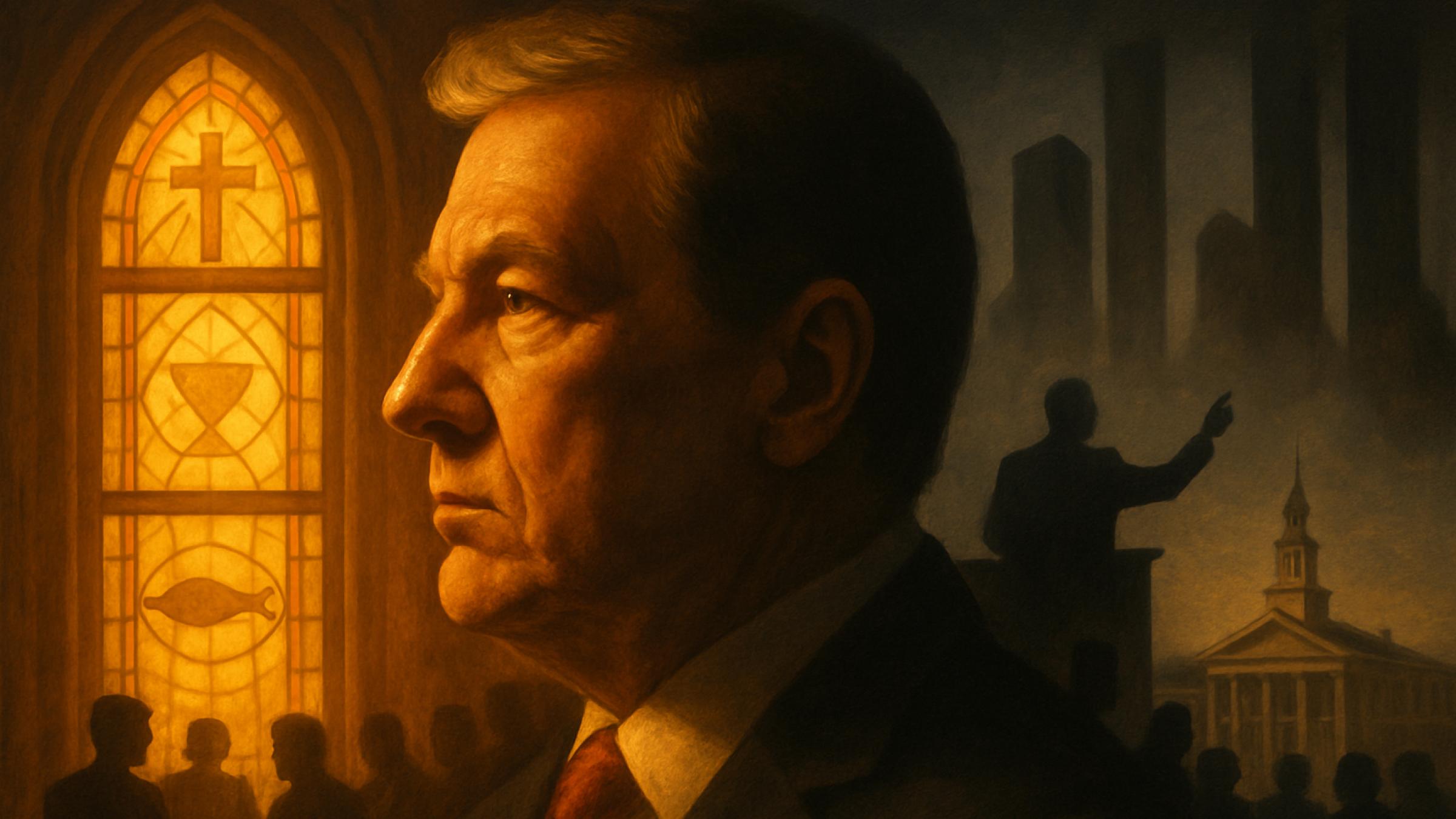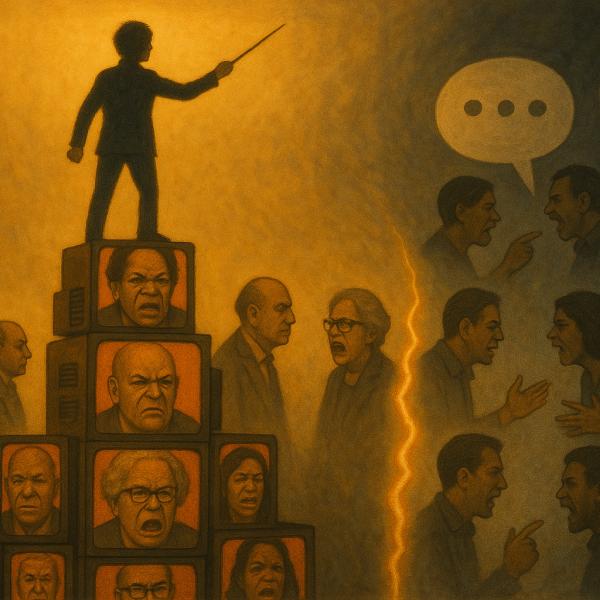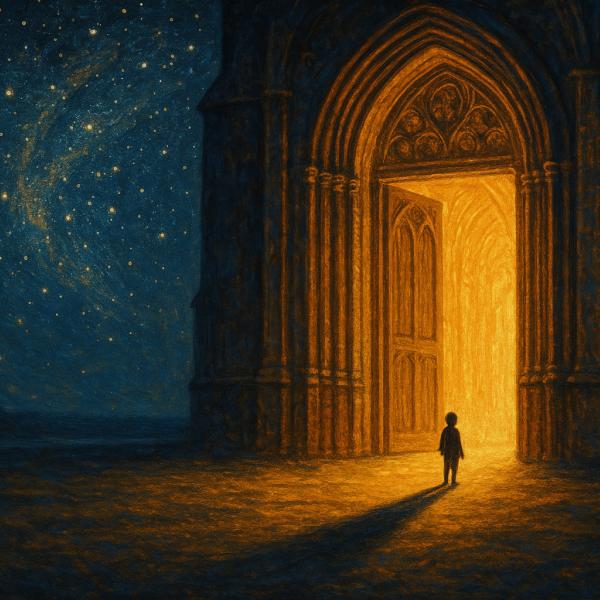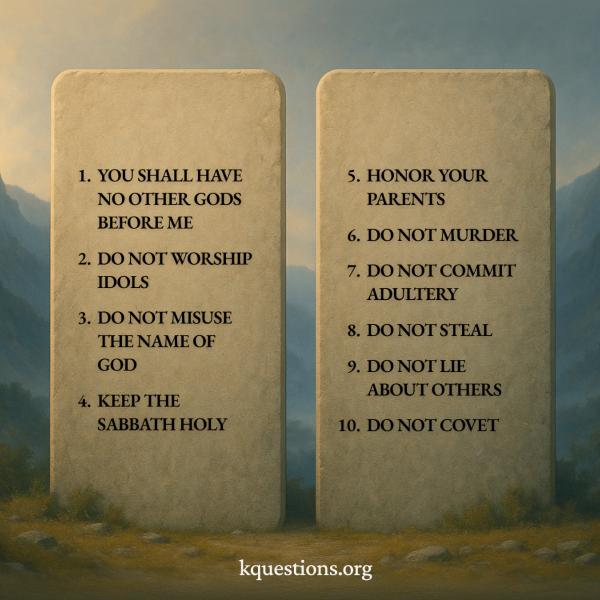
Bottom Line Up Front
Donald Trump's long spiritual journey mirrors American religious trends. His core values of winning, strength, and loyalty have remained remarkably consistent, but the packaging evolved from Presbyterian tradition to prosperity gospel to politically-framed providence.
The Early Years (1946-1968): Foundations of a Worldview
Donald Trump's earliest moral and spiritual framework was shaped by his family's Presbyterian tradition, a branch of Christianity. He was born in 1946 in Queens, New York, and raised by a Scottish immigrant mother, Mary, who may have instilled some Presbyterian values.[1] His father Fred modeled an uncompromising business ethic centered on achievement and resilience.[10][13] When Trump was 13, his parents made the important decision to send him to New York Military Academy, which had a big impact on his developing character.[2][4] The academy's strict discipline and competitive atmosphere emphasized strength, dominance, and winning as paramount values.[4]
In 1959, Trump was confirmed at First Presbyterian Church in Jamaica, Queens, continuing his religious formation.[3] During this time, the Trump family began attending Marble Collegiate Church in Manhattan, where minister Norman Vincent Peale is said to have significantly influenced Trump's spiritual outlook.[6] Peale's "Power of Positive Thinking" philosophy—which blended Christian language with success-oriented principles—taught that visualizing success, having unwavering self-confidence, and avoiding thoughts of failure were almost spiritual disciplines. [6] This theology suggested success was part of God's plan, creating strong links between achievement and divine favor. [6]
The Business Years (1968-2000): Pragmatism and the Pursuit of Achievement
During his decades building his real estate empire, Trump's expressed values centered more on pragmatic success rather than spirituality. During this period, his philosophy can be characterized by several consistent principles: the importance of winning, the necessity of projecting strength, and the virtue of loyalty above all else. "I value loyalty above everything else—more than brains, more than drive," [17] Trump stated, revealing a moral framework where personal allegiance outweighed abstract ethical principles.
Another significant influence during this period was Roy Cohn, the controversial lawyer who mentored Trump in the 1970s. Cohn believed in being aggressive, never admitting fault, and overwhelming counterattacks ("10 times as hard") against critics.[5] This confrontational approach became a defining element of how Trump operates, shaping his view of life as fundamentally a battle.[5]
For decades, Trump rarely spoke publicly about faith or spiritual matters. His sense of right and wrong seemed more guided by business pragmatism rather than theological considerations. Success, wealth, and fame became his measures of meaning and worth, with little reference to traditional religious values like humility, forgiveness, or service to others.[9] When asked about his beliefs during this period, Trump would typically identified as Presbyterian but offered few specifics about how faith shaped his decisions or worldview.[3]
Political Awakening (2000-2015): Evolving Positions and Religious Identity
As Trump began considering political ambitions in the early 2000s, his public statements on moral and religious issues evolved. A significant shift occurred around 2011 when Trump changed his position on abortion from pro-choice to pro-life. He explained this transformation by citing a friend's experience of nearly aborting a child who later brought great joy, though critics noted the timing coincided with his presidential aspirations.[3]
During this period, Trump formed a relationship with televangelist Paula White after seeing her television program.[9] He contacted her, and White became an important spiritual advisor, suggesting openness to broadened religion influences. Association with prominent religious figures like White likely further influenced Trump toward “prosperity gospel” views—where wealth is equated to God’s favor and transactional spirituality is sprinkled in (give donations or enough faith and get blessings) [3]
Trump's approach to truth and knowledge remained consistent with his business years. He prioritized personal intuition over “expert” consensus. He wrote, "It's instincts, not marketing studies," and advised readers to "listen to your gut." This approach of valuing personal judgment over external authorities would later manifest in the extent of his criticism toward scientific consensus, media reporting, and high-ranking government figures.[11]
Presidential Campaigns and Presidency (2015-2021): Religion as Identity and Policy
Trump's first presidential campaign saw a notable rise in religious language and interaction with faith communities, especially collections of Christians commonly termed “evangelicals” by the political discourse.[12] While his familiarity with religious language sometimes revealed gaps (famously referring to "Two Corinthians" instead of "Second Corinthians"), his outreach to religious voters became central to his political identity.
In 2016, Trump still identified as Presbyterian, but by 2020, he declared himself a nondenominational Christian. This shift in self-identification mirrored the journey of millions of Americans migrating away from traditional denominations toward secularism, a more undefined and individualized “spirituality,” or nondenominational Christianity.
Critics, supporters, and neutral observers alike have rare consensus that Trump possesses an exceptional intuition for public sentiment and cultural shifts. Many, including both devout followers of Jesus and irreligious individuals, have seen Trump's shifts to be prioritizing popular value over bold spiritual stands. [3]
Trump's understanding of Christianity was pragmatic rather than deeply theological. When asked who Jesus was to him, Trump answered, "Jesus to me is somebody I can think about for security and confidence. Somebody I can revere in terms of bravery [and] courage" [19]. He framed Christ more as a source of personal strength than as Savior or Lord.
As president, Trump implemented policies aligned with religious conservatives, especially in areas like choosing judges, limiting abortion, and protecting religious freedoms.[12] He created a White House Faith Office and surrounded himself with evangelical advisors.[16] His rhetoric increasingly incorporated religious themes, famously declaring, “In America, we don’t worship government. We worship God.”[20]
Tensions continued between Trump's professed Christian values and his behavior and policies. His reluctance to admit wrongdoing or seek forgiveness with statements such as ("I like to be good. I don't like to have to ask for forgiveness. And I am good. I don't do a lot of things that are bad. I try to do nothing that is bad.") was in contrast to central Christian beliefs about human sinfulness and the need for repentance (heart-turning) and grace (undeserved kindness) [18]. His harsh language, including personal attacks on his opponents, raised questions about whether he was consistent with Christian ethics of love and humility. [12]
Post-Presidency (2021-Present): Providence and National Restoration
In recent years, Trump has framed his political journey in providential terms, especially after the 2024 assassination attempt. "I was saved by God to make America great again," he declared in his 2025 inaugural address, suggesting a divine purpose behind his political mission.[11] His rhetoric has more explicitly lamented moral and religious decline in America, urging a "religious revival" and warning on Lex Fridman’s podcast that "our country is missing a lot of religion... Without religion, there's no real guardrails."[21]
Trump's view of salvation can be accurately characterized by the statement, "You're supposed to go to Heaven if you're good," which he stated in a 2024 interview. This reflects simplistic moral judgments at odds with baseline Christian beliefs about grace. [21] His understanding of evil continues to be externalized—located in enemies to be defeated rather than a condition affecting all humanity.
This “Good People/Bad People” theology doesn’t take into account that almost everyone sees themselves as a “good” person, often blaming others or their situations for any problems. Even with this in mind, this perspective is one of the most common worldview pillars in the world today.
Conclusion: A Distinctive American Religious Journey
Donald Trump's spiritual and philosophical journey reflects a distinctly American story about religion. Throughout his life, we observe remarkable consistency in core values—winning, strength, loyalty, competitive instinct, and pragmatism—while the expression and context of these values have evolved from business to politics to increasingly religious framing.
His journey reflects broader currents in American spirituality. These include the influence of Norman Vincent Peale's success-oriented theology, the migration away from traditional church identities, and the complicated relationship between personal faith and public policy. The tensions between Trump's stated beliefs and certain aspects of his behavior highlight the challenging relationship between religious ideals and political realities many Americans navigate.
Trump's worldview blends:
- Business Pragmatism
- Prosperity Gospel (overtones of wealth = God’s favor, give-to-get spirituality)
- "Good People/Bad People" Theology (no centrality of repentance or grace)
- Nationalist Identity
—continues to both resonate with and alienate different segments of American society, making him a significant case study in contemporary worldview, beliefs, and values.
Note to Readers:
This is a living document that will be updated as Donald Trump's spiritual journey changes and new information emerges.
We are committed to accuracy and fair analysis across groups, worldviews, and political views. This dedication goes beyond words down to the ways we operate and are funded. We eagerly welcome your feedback to improve this content. If you have corrections, sources, or insights, please share them using the form below.
Works Cited
[1] "Trump on Christianity's Importance in America." YouTube. https://www.youtube.com/watch?v=Ll2b0j5w9aw
[2] "Examining the Academic Credentials of President Trump." Factual America. https://www.factualamerica.com/trump-talk/examining-the-academic-credentials-of-president-trump
[3] "Donald Trump and Religion." Wikipedia. https://en.wikipedia.org/wiki/Donald_Trump_and_religion
[4] "Trump the 'Bully': How Childhood & Military School Shaped Him." PBS Frontline. https://www.pbs.org/wgbh/frontline/article/trump-the-bully-how-childhood-military-school-shaped-the-future-president/
[5] "The Roy Cohn Playbook." PBS Frontline. https://www.youtube.com/watch?v=mYMA3-ET4Ow
[6] "The Trumps' Family Church." https://www.youtube.com/watch?v=3UAG0FY4yaQ
[7] "Donald Trump's Morality: He Doesn't Believe In It." CNBC. https://www.cnbc.com/2017/08/15/donald-trumps-morality-he-doesnt-believe-in-it.html
[8] "President Donald J. Trump Establishes White House Faith Office." White House. https://www.whitehouse.gov/fact-sheets/2025/02/fact-sheet-president-donald-j-trump-establishes-white-house-faith-office/
[9] "Paula White-Cain: Pastor, Trump Adviser, Evangelical Christians." Slate. https://slate.com/news-and-politics/2025/01/paula-white-cain-pastor-trump-adviser-evangelical-christians.html
[10] "Donald Trump." Wikipedia. https://en.wikipedia.org/wiki/Donald_Trump
[11] "I Was Saved By God: Faith Quotes from Trump's Inaugural Speech." CBN News. https://cbn.com/news/politics/i-was-saved-god-faith-quotes-trumps-inaugural-speech
[12] "Donald Trump, Jewish & Catholic Voters, Religious Americans." AP News. https://apnews.com/article/donald-trump-jewish-catholic-voters-religious-americans-c6b2c15a6019583b8afae4d496480469
[13] "Donald J. Trump." White House History. https://www.whitehousehistory.org/bios/donald-j-trump
[14] "Trump and Religious Leaders." BBC News. https://www.bbc.com/news/articles/c20g1zvgj4do\
[15] "Trump, Christian Theology, Nationalism." The Nation. https://www.thenation.com/article/society/trump-christian-theology-nationalism/
[16] "President Donald J. Trump." Trump Presidential Library. https://www.trumplibrary.gov/trumps/president-donald-j-trump
[17] Trump, Donald J., and Bill Zanker. "Think Big and Kick Ass in Business and Life." HarperCollins, 2007.
[18] Trump on God: 'I don't like to have to ask for forgiveness'. Business Insider. https://www.businessinsider.com/trump-on-god-i-dont-like-to-have-to-ask-for-forgiveness-2016-1
[19] Interview With Donald Trump. Townhall. https://townhall.com/columnists/calthomas/2016/06/10/interview-with-donald-trump-n2175646
[20] Trump: 'In America we don't worship government, we worship God'. Washington Post. https://www.youtube.com/watch?v=FWTQgl4VSEY&ab_channel=WashingtonPost
[21] Donald Trump Interview | Lex Fridman Podcast #442. Lex Fridman. https://youtu.be/qCbfTN-caFI?si=YPRhew5DC1xYJ72c






